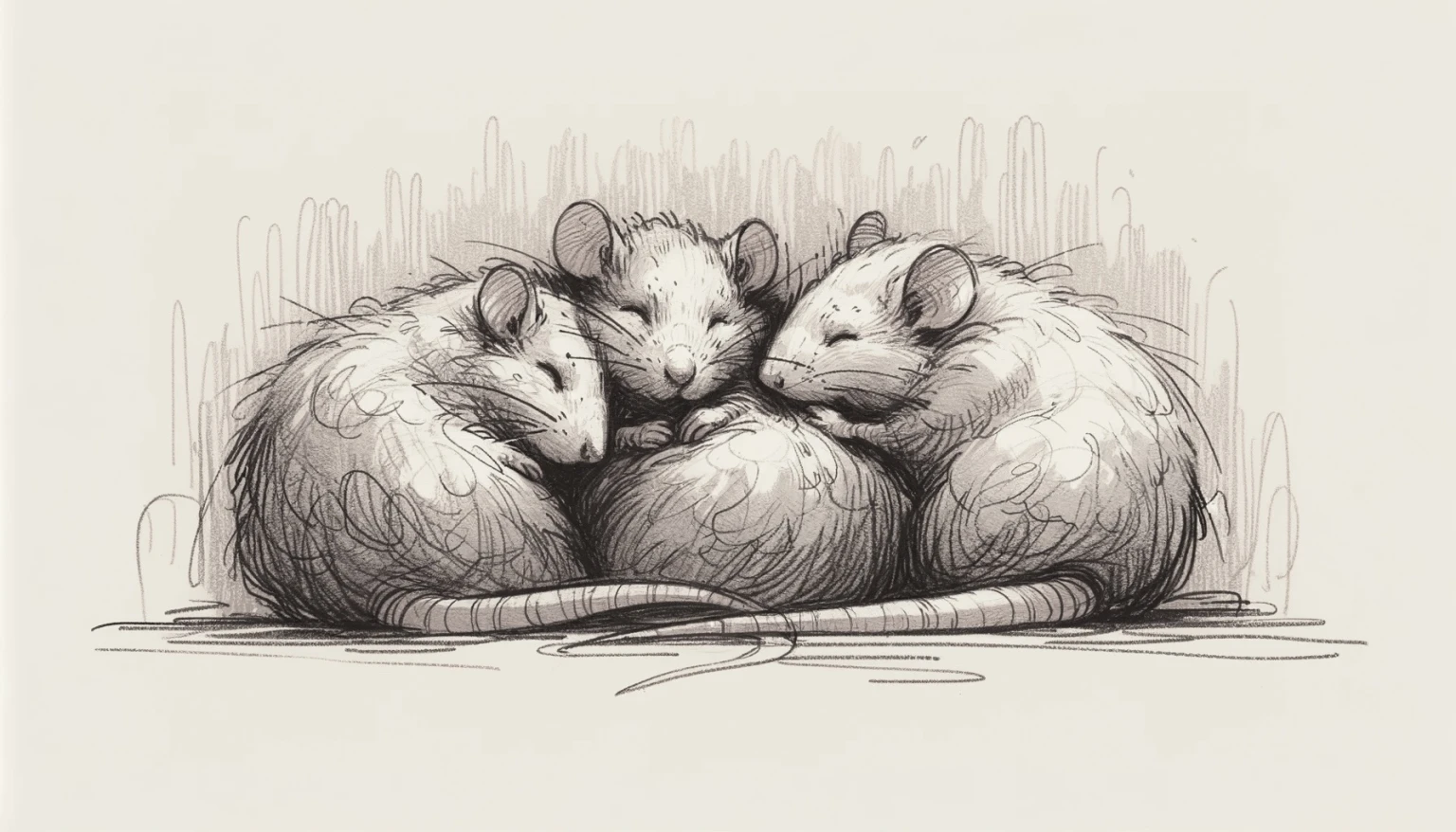Basic information about rats 🐀
When deciding on rats, it's important to consider their basic needs, which include their social nature, need for movement, and dietary requirements.
The social nature of rats
Rats are exceptionally social creatures. What sets them apart is their surprising ability to form emotional bonds, not only with other rats but also with humans, making them excellent pets for those seeking deep relationships with their companions. However, remember that a human cannot replace another rat. These animals communicate with each other using ultrasound, which we humans cannot hear. Over time, humans begin to understand the body language of rats and can teach them various tricks (like spinning) or to respond to their names, but rats spend most of their day resting and sleeping. They become active in the evening and at night, so despite providing maximum attention to a rat every day, a human cannot replace the companionship of another rat.

In a group, rats groom each other, wash, and often sleep cuddled up together. Scientific research indicates that the brains of rats are more developed when they have the company of other rats. In other words, this provides them with mental comfort and proper social development.
Read more here: Rat Park Experiment.
Rat adoption
When it's time to choose rats, it's worth looking for trusted breeders or places that provide appropriate conditions for their pupils.
Read more about it here: Where to Get Rats?
Veterinary visits and expenses
While rats bring a lot of joy and satisfaction, we must not forget the responsibility we bear by deciding to keep them. This is a commitment for several years (more about it can be found here: How Long Do Rats Live?), which requires time, money, and commitment.
 Maintaining a rat is certainly not the cheapest, especially when the animal gets older and needs specialized veterinary care. If we're lucky, health problems only appear after about a year and a half or two years of the rodent's life. Nevertheless, it's worth keeping in mind also age-unrelated diseases such as external parasites or ear and lung infections, which also occur frequently. Unfortunately, rats are prone to illnesses, veterinary procedures by a good specialist are expensive, and there are still relatively few veterinary facilities for rats in Poland.
Maintaining a rat is certainly not the cheapest, especially when the animal gets older and needs specialized veterinary care. If we're lucky, health problems only appear after about a year and a half or two years of the rodent's life. Nevertheless, it's worth keeping in mind also age-unrelated diseases such as external parasites or ear and lung infections, which also occur frequently. Unfortunately, rats are prone to illnesses, veterinary procedures by a good specialist are expensive, and there are still relatively few veterinary facilities for rats in Poland.
Balanced nutrition
To ensure optimal health conditions for rats, their diet requires careful balancing. As omnivorous animals, they need a variety of foods, but not everything is suitable for them. The basis of their diet should be grains, as well as vegetables and fruits rich in nutrients, supplemented with herbs. Lean meat can be part of the diet, but only occasionally. Other treats that rats love are eggs and jarred baby food ;) It's necessary to avoid feeding rats salty, seasoned, or overly processed food, as well as sweets. Do not use salt licks or even natural cuttlebone. The need to provide dry bread for teeth abrasion is also a myth. What we provide in the feed is completely sufficient for rats to grind their constantly growing incisors. As with any animal, excessive feeding is not advisable – regular monitoring of the rats' body weight is essential to prevent obesity.
A home for a rat: a spacious cage
Choosing the right cage is one of the most important decisions. For two rats, a cage measuring at least 80 cm x 50 cm x 80 cm (31.5 in x 20 in x 31.5 in) is recommended. It's important that the cage is located in a place without drafts and excessive sunlight, but also allows rats freedom of movement and play. Rats appreciate a variety of accessories and toys, which can be both purchased and handmade. The cage should be equipped with items that stimulate physical and mental activity – hammocks, tunnels, etc. As excellent climbers, rats will appreciate the opportunity to climb, but plan the equipment to avoid falls from height, for example by placing a hammock at mid-height to catch a falling rat. It's also a good idea to place a corner toilet at the very top, as many rats won't want to go down to urinate and defecate. For older rats, provide comfortable places in the lower parts of the cage, and also get a smaller cage in advance to temporarily separate a rat in sickness or after a surgery.
For planning a larger rat pack, to calculate the size of the cage, we can use a special cage calculator. On the Internet, we can find both simple calculators (where we only enter the dimensions of the cage, or the number of rats we want to have) and more complex ones, taking into account its equipment, like here (in Polish): http://pliki.szczury.biz/klatki/rcc.html.
Safe play area
Rats also require regular activity outside the cage, which is essential for maintaining their good physical and mental condition. The play area should always be supervised by the owner and safe, free from cables and other potential hazards (e.g., other animals, poisonous plants). Rats love intellectual challenges. Simple games, such as hiding treats to be found, can significantly improve their mental well-being. Enrichment with various accessories, like mazes and plastic tubes, will provide the stimulation necessary to maintain a healthy and happy mind.